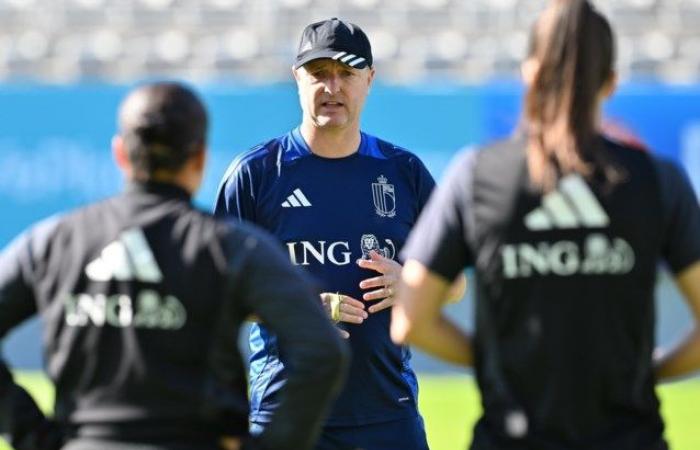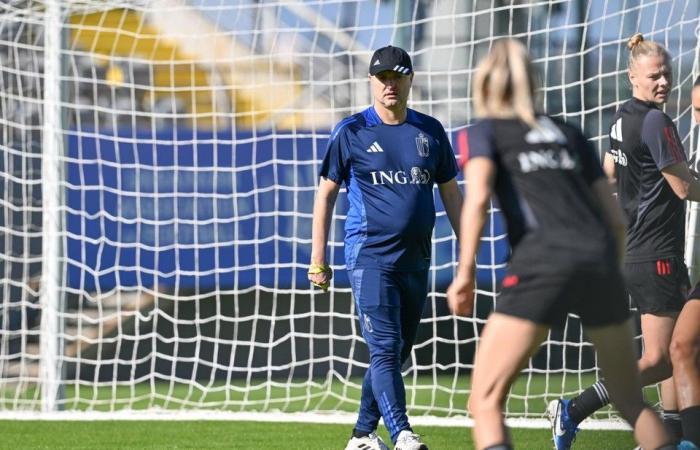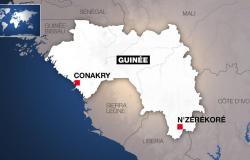LIVE. Don’t miss anything from the first match against Ukraine here!
A practice match against North Korea, in Veldwezelt, a remote corner of Limburg on the Dutch border. There are more appealing ways to make your debut as coach of a Belgian national team. But thirteen years later, Ives Serneels is still in the saddle, while the Football association successively said goodbye to Leekens, Wilmots, Martinez and soon perhaps also Tedesco. The 52-year-old Aarschot native does not believe that the European Championship jump-off matches against Ukraine (today in Greece and Tuesday in Leuven) could be his last.
“I saw after just one week that the women had the right attitude and the will to play professional football. We have expanded that ambition step by step, together with the federation and the clubs. If I had demanded from day one that we had to become fully professional, I would not have been here so long.”
© Isosport
You have now been working for thirteen years and professional football has still not been achieved. Didn’t you expect women’s football to have progressed further?
“Don’t expect, hope. After we reached the quarter-finals at the previous European Championship, I also mentioned that. We then defeated the Netherlands and England in the Nations League, and expectations suddenly became incredibly high. Then I said during an analysis for the football association: ‘I will never play another tournament if the players are not all fully-fledged professionals.’ There is still work to be done.”
Does that mean that you will soon leave players who are not professionals at home from the European Championship?
“No, because I don’t want to deny anyone anything. I didn’t mean it as criticism towards the players, I meant it as a signal to the football association and the clubs. I never pressured anyone to turn pro. I am happy that many players have a professional attitude. Many of them are still studying and taking classes remotely. I said at a team meeting last week that I think it is incredibly impressive with the core we are starting with and that the choices will be difficult.”
At the same time, the Flames also remain dependent on a limited number of top players. Tessa Wullaert had a share in every goal in the previous match against Greece.
“Every team has players who – if they are in shape – can make the difference. But against Greece, Tessa played in a different role (in 10, behind Ella Van Kerkhoven, ed.). The strong players know that they need the other players.”
How can you raise the level further?
“The Football Association can further tighten the licensing conditions for the clubs and I hear that they also intend to do so. But players can also make choices individually. I will not put pressure on anyone to go abroad, but I do see players opting for more intensive training and competitions. Some clubs in Belgium are also working on this. As a football association, we used to organize training sessions ourselves, but we no longer do that. Half of the players now play abroad. They make smart choices. For example, Sari Kees has chosen Leicester. She can take the step to a team like Arsenal later.”
© Isosport
Shouldn’t the Belgian league itself become professional?
“Absolute. However, today there is no market in our country to set up twelve fully-fledged professional clubs. The Netherlands has the same problem. Fortuna Sittard tried to compete with the big clubs, but that went wrong (Due to financial problems, top players like Wullaert left, ed.). The solution is therefore obvious: a women’s professional competition is possible with a Beneliga.”
Anderlecht has been trying for years to get into the group stage of the Champions League. Why doesn’t that work?
“The last step is always the most difficult. That is also the case with the Red Flames. We rose fairly quickly from 32nd place in the world rankings to the top 20 (they are currently 20th, ed.). The next step, to the top 12, is more difficult. Other countries are also not standing still.”
Do you think the Flames play the same sport as the Red Devils?
“Yes, it’s still football. The training preparation, the training content, the individual follow-up, the communication… As a trainer, my approach for men would be exactly the same as for women.”
If you ever get a successor, could he come from men’s football?
(delicately) “Many people who laughed at me at the time when I chose women’s football now want my job. For me, that is the sign that we have achieved something here.”
Have you changed as a coach in those thirteen years?
“Thanks to the feedback from the players and the women, I have become a different trainer and person. Women ask more than men: ‘Coach, why are we doing this?’ I have learned to communicate more directly. If I don’t call a player for an internship after she attended one last time, I will always speak to her personally. At first I didn’t. In men’s football, a coach gives his selection and that’s it. If I were training men tomorrow, I would do it differently. People deserve an explanation.”
Why are there so few women trainers?
“Until five or six years ago, there was hardly any investment in training courses for women. That has now changed. The Belgian trainer training now also includes clips from women’s football. Trainers from men’s football who do an internship now also do so with women. Soon it might be the other way around.”
If you don’t reach the European Championship, will the campaign have failed?
“That seems logical to me. I don’t like negative words like ‘must’, ‘none’, ‘never’ or ‘not’. There is already enough misery in the world. I do know how hard we all worked together. Only if you work for something can you achieve something.”
Do you tie your fate to qualifying?
“After we had one point after two matches at the previous European Championship, I was asked the same question. I then said that I am very happy with my job and the work that has been done here. Without being falsely modest: there is something there. But I don’t cling to the position either. I can also mean something to women’s football in a different role. I just hope that that is something that I will be able to discuss with the federation.”
So that no one decides anything on your behalf?
“I have no ego, but talking to me seems like a minimum of respect for what has been built up here in recent years. Communications manager Stefan Van Loock recently told me: ‘Ives, when people talk about the development of women’s football in twenty or thirty years, they will talk about you.’ It makes me proud that I was able to be a part of that.”







